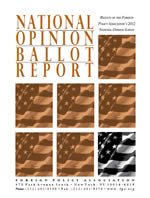Participants split on threat posed from al-Qaeda in 2012 National Opinion Ballot

Americans participating in the Great Decisions annual National Opinion Ballot express strong support for closer cooperation with Mexico, South America on curbing drug violence.
By Tyler Benedict
After over a decade of war, the United States has drawn its military involvement in Iraq to a close and is beginning to withdraw from Afghanistan. However, questions still remain: what exit strategy will help Iraq and Afghanistan build stable democratic nations while simultaneously allowing the U.S. to achieve its counterterrorism goals? What role should the U.S. play in the future of Iraq and Afghanistan?
The U.S. entered Afghanistan in 2001 with the stated goal of weakening al-Qaeda and bringing Osama bin Laden to justice. Today, bin Laden is dead, as are several other key terrorist leaders. However, the jury is still out on whether this means that al-Qaeda is on the wane. Responses to the Foreign Policy Association's National Opinion Ballot Report highlight this uncertainty, with balloters split nearly 50-50 on whether al-Qaeda has lost momentum or whether the terrorist organization still poses a significant threat. This pattern of uncertainty was also apparent when respondents were asked why the U.S. should maintain its presence in Afghanistan. Responses were split nearly evenly between "thwart[ing] the Taliban and terrorist groups," "curbing Pakistani extremists," and "assist[ing] the Afghan government in stabilizing the country." This suggests that many balloters are questioning what threat terrorism poses in a post-9/11 world and thinking about which methods will be most effective in the so-called "War on Terror."
In recent years, Pakistan has emerged as a key player in this war, although it has been a somewhat unreliable regional partner. The U.S. has begun to increase its focus on Pakistan as its involvement in Iraq and Afghanistan winds down, stepping up drone strikes in the country and putting increased pressure on Islamabad to curb the activities of extremists. Such policies have at times strained U.S.-Pakistan relations, but NOBR respondents seem to approve of this new approach in the region. Seventy-two percent of balloters indicated that they favor an increased effort to "stem the flow of insurgents, their materiel, and support from Pakistan into Afghanistan."
Perhaps the most looming question remaining is what the future has in store for Iraq and Afghanistan. Ten years later, Colin Powell's "Pottery Barn Rule" still echoes: "You break it, you own it." Balloters have signaled that they believe Iraq and Afghanistan should be viewed as young democracies worthy of assistance, but as Iraq deals with internal divisions and Afghanistan contends with a resurgent Taliban it is unclear to what degree the United States will remain involved in the region. The future is cloudy, and this is reflected by the wide-ranging opinions of NOBR respondents.






